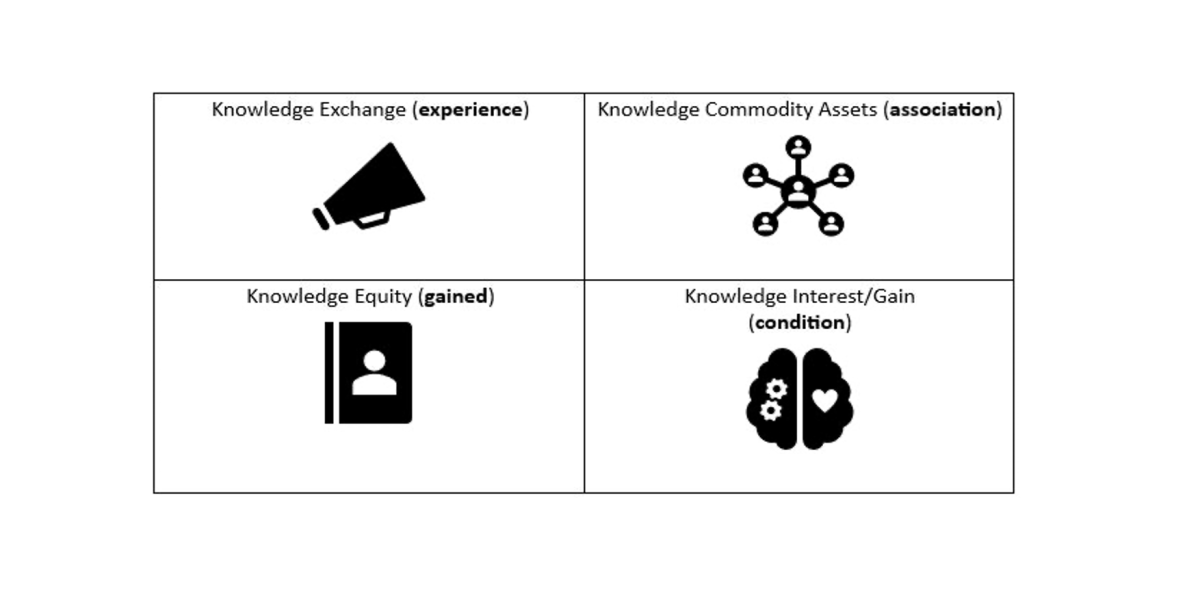...
How would you like to be a Guest Blogger for KMI? Email us at: info@kminstitute.org and let us know your topic(s)!
Driving PKM Creation with a Focus Around Knowledge
 Data Insights has fascinating outcomes. It enabled true business value
Data Insights has fascinating outcomes. It enabled true business value
if systemic assets can be governed, co-created, promoted and valued enabling multiple stakeholders to market information and engage.
When asked about the true business value of KM, leaders get mixed with Knowledge Management. What they are truly targeting is Knowledge Gain.
According to Webster dictionary, Knowledge is the fact or condition of knowing something with familiarity gained through experience or association. Yes, you read it right - there are four words that fit perfectly which should be the basis of designing effective outcomes around ensuring knowledge flows from those who need it to those who can provide.
If we look at these elements a little closer, we can understand how Knowledge flows
Knowledge Exchange (experience): The Knowledge Management process captured user feedback often through the annual KM survey, and the findings reveal mixed experiences. Many a times these outcomes are not directly related to the Knowledge Exchange as the survey is looking to link tangible elements such as to what extent has the KM System facilitated improving a Business Index whereas the real scenario is KM is solving a particular Problem around a user need in context. So, the real point is should we begin around understanding these KM Touchpoints and capturing how Knowledge is facilitating improving a user journey through a Pain/Gain map as shown below.


Knowledge Interest (condition): If we look closer at the below snapshot it is of a User Persona map where we can see that the need from Knowledge is different, and this condition drives the Community to come together if their individual interests is elevated by the Knowledge Process Design.

Knowledge Commodity Assets (association): In my earlier blog on The '80/20' Pareto Principle in Knowledge Management I presented the 5-C Roadmap where we talk about developing a Learning Organization and protect most important activities from the least important ones and then prioritize them among your teams and ensure you re-visit them once a quarter.

As shown below a KM Framework should aim to develop a Learning Organization where Knowledge is shareable because it’s improving the overall Performance Measures and driving Continuous Improvement mindset where every individual is part-taking in creating Knowledge Assets.

As you can see the above talks about ensuring assets are governed, co-created, promoted such that multiple stakeholders engage and benefit through the org-wide Knowledge Framework.
Then where are we missing the point? It is through understanding how data insights are marketed individually and valued by individuals, teams, and organizations against global benchmarking standards. This is where AI is filling the gap and let’s talk about it in my next and final point.
Knowledge Equity (gained): Generative AI is built around data sets and identified use-cases around Personal Knowledge Management (PKM). AI is filling a huge gap to contextualize existing information and present curated content for just-in-time resolution. From my earlier article on Designing a KM Experience Platform – What can we infer from CX Strategy we learn that the goal is just not capturing End-user Feedback but integrating it with real-time Customer Journey metrics and designing user features. Knowledge Asset Management (KAM) is a growing field, and every user should be trained on how their PKM can be driven towards KAM and they should be a defined process for these data insights to be capsules of knowledge that benefit the larger community. Today LinkedIn offers many avenues for PKM where users received a Community Top Voice badge for sharing their views and enabling curated content to be presented.
In-Summary
At the outset our KM Metrics should measure both the KM Effectiveness and KM Efficiency. The focus should move from enabling Knowledge flow through Technology, People and Processes to building elements around Culture, Leadership and Performance Management. It is important to factor how PKM is playing a larger role and use AI to build Knowledge Equity and ensure the same is curated back into the experience leading to more association.

The final frontier is each organization has a customized KM Process Design and the same is based on designing the right user personas and ensuring the KM Touchpoints are constantly improved. The focus is on capturing the by-product of those fascinating outcomes that come from individuals associating-gaining-experiencing-conditions that ensures Knowledge is commoditized as per a defined KAM framework.
Disclaimer: These are purely my own views and experiences as a seasoned KM practitioner in defining KM services aligned to organization strategy through design thinking.
 Michael Sequeira is based in the UK and is known for Program Managing large Digital Transformation programs for Wipro as Change Management Consultant. He was a key part of their Core KM team and is credited with Program Managing their Customer Collaboration Portal around enabling Client Centricity, driving adoption across the globe and working with CXO functional leaders across business units. He also has experimented with Account Management giving him a true sense of Customer Centricity, delivering outcomes and building trust with clients that have shaped him as a professional.
Michael Sequeira is based in the UK and is known for Program Managing large Digital Transformation programs for Wipro as Change Management Consultant. He was a key part of their Core KM team and is credited with Program Managing their Customer Collaboration Portal around enabling Client Centricity, driving adoption across the globe and working with CXO functional leaders across business units. He also has experimented with Account Management giving him a true sense of Customer Centricity, delivering outcomes and building trust with clients that have shaped him as a professional.
Through KMI Blogs he has introduced us to Design Thinking, Business Storytelling, Creative KM, CX Strategy, and more contemporary topics, sharing his proven expertise and practical insights. He enjoys networking in his free time and has a true passion for people. Connect with Michael at LinkedIn.
Featured Blog: The Elevator Pitch and KM - What's the Connection?
Featured Blog: How to Design a KM Experience Management Platform - What we can infer from CX Strategy
Archives
- April 2024 (5)
- March 2024 (4)
- February 2024 (4)
- January 2024 (3)
- December 2023 (2)
- November 2023 (2)
- October 2023 (3)
- September 2023 (3)
- August 2023 (6)
- July 2023 (4)













